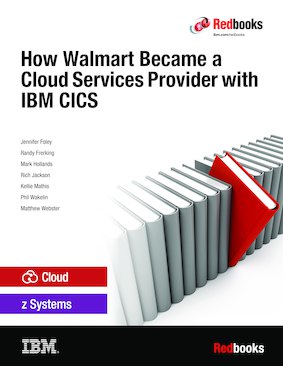
Published on 22 April 2016
Read in Google Books Order hardcopy
Share this page:
ISBN-10: 0738441732
ISBN-13: 9780738441733
IBM Form #: SG24-8347-00
Authors: Jennifer Foley, Randy Frerking, Mark Hollands, Rich Jackson, Kellie Mathis, Phil Wakelin and Matthew Webster
Abstract
The world has changed. With the new cloud options, enterprises no longer must rely on only their IT organization to meet their computing needs. Business units now have options that were not available just a few years ago. They can get some of their needs met by traditional IT processes, and reach out to a cloud provider to meet other needs. The concern is that if you, working in a traditional IT organization, do not meet these needs, someone else will.
This IBM® Redbooks® publication helps you to understand the benefits of becoming your own cloud service provider. It describes a simple approach that allows you to be successful. The main focus of the book is lessons learned from the implementation by an IBM client, Walmart Stores, Inc.®, that achieved impressive results in their efforts to become their own cloud service provider to their developer community. In this way, Walmart successfully made z Systems a relevant part of their Hybrid Cloud strategy.
Walmart embarked on this journey to help their application developers achieve results that were previously time-consuming and difficult to deliver. In the process, they realized that they had everything that they needed to become a services provider to their developer community. This book describes the choices that Walmart made, and explains the steps they took to be successful.
The goal of the book is not to imply that the only way to achieve success is by following Walmart’s process exactly. Rather, this book allows you to use the same basic constructs, but choose implementation details that fit your environment so that you can achieve success on your own terms. With IBM CICS® Transaction Server (TS) for z/OS®, you also have the resources for a successful transition to becoming your own cloud service provider.
IBM Design Thinking is a methodology that is used by designers to solve complex problems by focusing on individual user roles. This book is organized from the viewpoint of these roles in the IT organization. It provides guidance in the following areas:
- What does the line of business expect from a cloud service?
- What topology and high availability characteristics does the system programmer need?
- What unique facilities does IBM CICS provide to the service developer?
- How does a developer discover and consume services in an application?
- How does the operations team manage the service in production?
One of the services that Walmart built and how the decisions made by each job role affected the overall outcome of the service are used as an example throughout this book. It shares the experience of the team that created this and other business critical cloud services that are all hosted in CICS. Comments from Walmart IT leaders that were captured during the authoring process are presented to emphasize why the company adopted cloud and how cloud has helped Walmart to achieve success.
Developers understand the risk protection that IT groups provide. They also understand that waiting to move applications to production, or for a service to be provisioned, compromises the agile environment required by today's businesses.
This book is intended for enterprise service providers looking to enable their developers to increase the speed at which functionality is delivered to the business. For more information about creating IBM z/OS cloud services, see Creating IBM z/OS Cloud Services, SG24-8324
Table of Contents
Chapter 1. Reasons to become a cloud service provider
Chapter 2. The service consumer
Chapter 3. The service provider
Chapter 4. The CICS systems programmer
Chapter 5. The z/OS systems programmer
Chapter 6. Operational considerations
Chapter 7. DevOps perspective